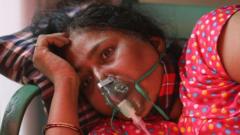On March 24, 2020, India heralded a strict Covid lockdown as the world braced for a pandemic that would devastate millions. The country's fragile healthcare infrastructure severely buckled, leading to a staggering death toll, which WHO estimates at over 4.7 million—tenfold the official number, provoking government denial over methodology flaws. BBC India journalists, five years later, reflect on their harrowing encounters that turned them into unwitting participants in a crisis.
In the summer of 2021, Soutik Biswas received a desperate call from a schoolteacher pleading for oxygen—her husband was fighting Covid in a Delhi hospital. The chilling reality of the second wave gripped the city as calls for assistance echoed in a climate where life-saving resources were alarmingly scarce. With oxygen levels plummeting to critical lows, Biswas felt the weight of despair as the scarcity became painfully evident.
The struggle for survival painted a grim picture. Yogita Limaye's heart-wrenching recollections captured the anguish of families fighting for mere seconds with overwhelmed medical services. As a woman outside a Delhi hospital mourned her dying brother, the cries for help filled the air—a community hopelessly scavenging for assistance as the pandemic mercilessly surged.
As reported by Limaye, the haunting image of funeral pyres burning at a crematorium underscored the death toll as officials frantically sought supplies. No one was untouched by the chaos; colleagues grappled with the cruel reality of loved ones falling victim to the disease. The personal losses spiraled, marking a tragic chapter in the lives of those covering the story.
The intensity of the lockdown clasped India in fear, but amid the anxiety, Geeta Pandey witnessed desperate citizens trying to reach family members, as the streets remained barricaded by enforcing personnel. Calls for aid flooded her phone—her own mother was bedridden, painfully unaware of the pandemic, while she lacked the means to visit.
Anagha Pathak's harrowing journey to document the lockdown's impact led her toward desolation. Families of displaced migrant workers wandered along empty routes, embodying the tragedy that escaped many media narratives. The woman and her child struggling under dire conditions etched an indelible mark on Pathak's memory, continuing to haunt her five years on.
As India negotiated the aftermath of the lockdown, the stories of loss, courage, and resilience from reporters paint a vivid portrayal of a nation's struggle against an unprecedented crisis, revealing the power of journalism as a witness to human suffering and endurance.






















